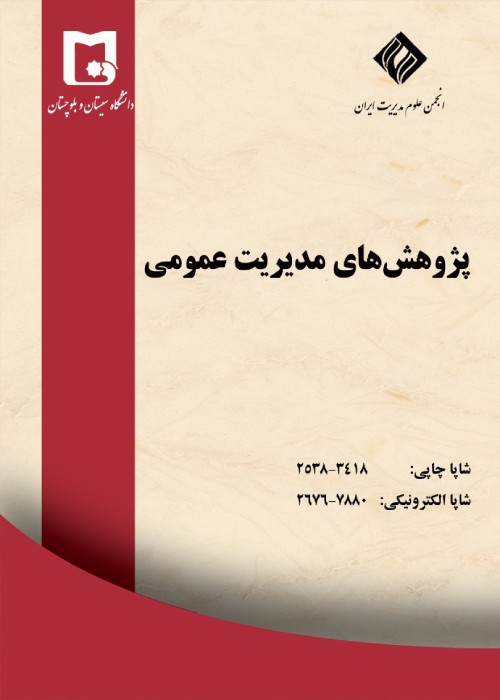Identification the Key Indicators Effecting on Citizenship with Emphasis on Promoting Democracy in Public Organizations
Author(s):
Article Type:
Research/Original Article (دارای رتبه معتبر)
Abstract:
In today's world, the word citizen is one of the foundations of democracy and democratic life. Since the present study seeks to identify citizenship indicators emphasizing the promotion of democracy in public organizations, at first, the views of 15 public administration elites through Delphi technic have been taken into consideration regarding the indicators affecting citizenship, public organizations and democratic citizenship. After collecting and designing the proposed model, its fitness has been scrutinized by compiling a questionnaire and distributing it among 385 employees of the social security organization and ministry of science research and technology in Tehran. Statistical analysis was done in the qualitative section. The validity and reliability of the research questionnaires were tested at first and after proving the normal distribution of the data, the model was designed. Result expresses the proper fit of the model of a democratic Citizenship in Public Organization, which also confirms the high correlation between the two elements of the quantitative phase data.
The participants in the qualitative sector include 15 public administration elites and in quantitative section, a sample consisted of 385 employees of the social security organization and ministry of science research and technology in Tehran.
Therefore, the model shows the relationship between the components of democratic citizenship and the components of public organization and Human factors
Introduction
The word “citizen” is not literally defined in public dictionary such as Moeen, Amid,…. However in bilingual dictionary such as Hayyem and Arianpoor, citizen is defined as heritage, native, townsman, which is free from military service. In one volume Persian contemporary dictionary, citizen is a person from a city or country and holds the rights it holds (Esmaeeli, 2001). In political dictionary, citizen is defined as “who has civil rights or privileges under the constitutional laws of a country” (Rezapour, 2006: 9). Different communities have different perspectives on what constitutes citizenship, the rights that citizens are given and the duties they must perform in order to achieve these rights. Citizenship rights are a combination of two words of rights and citizenship and its historical past is not transparent; citizenship rights are legal for citizens of the country in relation to public institutions such as political rights (Jafari langroodi, 2014: 1370). New texts consider governance as a way in which policymakers make decisions that make decisions possible for the realization of citizenship rights (Zahedi, & Ebrahiompour, 2012).the concept of citizenship and its rights in today's world is considered as the most important criterion of the legitimacy of democratic systems and is highly valued. So that even undemocratic governments use to justify public opinion. On the other hand, since the 1990s, managementism and citizen oriented, customer oriented are become important in public organizations. According to the philosophy and mission of the public administration is to provide the interests of the public, so all people and citizens are considered to be customer in public organizations (Hughes, 2018). The satisfaction of citizens and clients increases public confidence and loyalty, national consensus, public participation and national authority that in the current world are considered as the main indicators of measuring efficiency and development of the administrative and political system (Kazemi, 2006). Unfortunately in recent years there has been no research in our country on what to do and identify the indicators of democratic citizenship and their impact on the performance of public organizations. Moreover, the lack of a course on the rights and duties of citizenship in our university courses has caused the poor people's awareness of their rights. As the result of present research the more and more the governmental and public organizations are introduced to this issue and the conscious participation of citizens in public organizations providing services and products to improve the performance of organizations as far as possible.
Case Study
The participants in the qualitative sector include 15 public administration elites and in quantitative section, a sample consisted of 385 employees of the social security organization and ministry of science research and technology in Tehran.
Materials and Methods
The approach of this research is both quantitative and qualitative. Various methods used through the data collection that is firstly an interview was carried out and then by using a questionnaire data were collected. In addition, a deep research carried out via universities, digital libraries and databases. Statistical analysis was done in the qualitative section using Delphi technique. Therefore, the validity and reliability of the research questionnaires were tested at first and after proving the normal distribution of the data، using correlation.
Discussion and Results
The results showed that there is a significant relationship between the components of democratic citizenship, public organization and Human factors. The indicators of accountability and compensation as well as the rule of law directly affect citizens by giving citizens the right to vote and democratic participation of citizens.Therefore, the model shows the relationship between the components of democratic citizenship and the components of public organization and Human factors
Keywords:
Language:
English
Published:
Management Researches, Volume:11 Issue: 42, 2019
Pages:
179 to 199
magiran.com/p1967533
دانلود و مطالعه متن این مقاله با یکی از روشهای زیر امکان پذیر است:
اشتراک شخصی
با عضویت و پرداخت آنلاین حق اشتراک یکساله به مبلغ 1,390,000ريال میتوانید 70 عنوان مطلب دانلود کنید!
اشتراک سازمانی
به کتابخانه دانشگاه یا محل کار خود پیشنهاد کنید تا اشتراک سازمانی این پایگاه را برای دسترسی نامحدود همه کاربران به متن مطالب تهیه نمایند!
توجه!
- حق عضویت دریافتی صرف حمایت از نشریات عضو و نگهداری، تکمیل و توسعه مگیران میشود.
- پرداخت حق اشتراک و دانلود مقالات اجازه بازنشر آن در سایر رسانههای چاپی و دیجیتال را به کاربر نمیدهد.
In order to view content subscription is required
Personal subscription
Subscribe magiran.com for 70 € euros via PayPal and download 70 articles during a year.
Organization subscription
Please contact us to subscribe your university or library for unlimited access!


